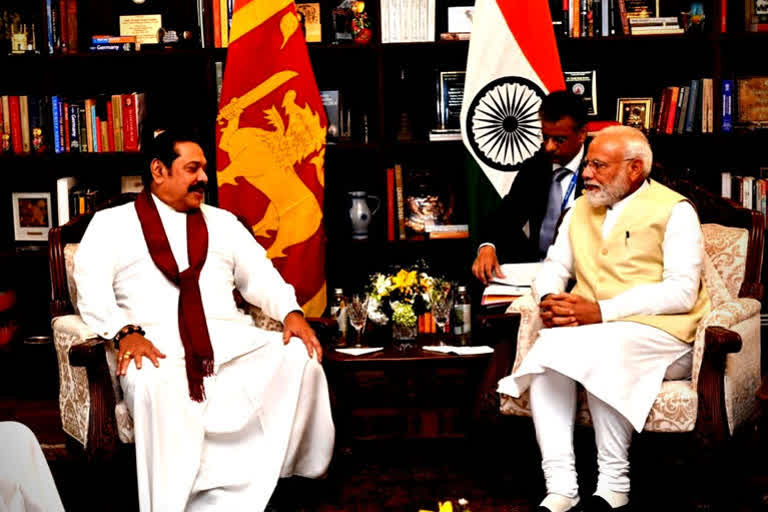Columbo: A four-day state visit to India by Sri Lanka’s Prime Minister Mahinda Rajapaksa, commencing today can be almost treated as ritualistic. After all, it is customary for newly installed presidents and prime ministers of the Indian Ocean island to visit their closest and geo-strategically significant neighbour India.
Upon his election as the island’s president on 18 November 2019, the premier’s younger brother Gotabhaya undertook his first state visit to India. After his election, Indian Prime Minister Narendra Modi too visited Sri Lanka in a demonstration of his much touted ‘neighbourhood first’ foreign policy.
But Premier Rajapaksa’s visit, is dissimilar to that of his presidential sibling’s recent visit to India. Gotabhaya, new to mainstream politics, is keen to project a different image and neutrality in foreign relations. And for good reason.
Read: Lanka PM Rajapaksa to finalise $450mn funding with India
Gotabaya’s close aides say, as the all-powerful defence secretary under his brother’s administration, he (Gotabhaya) had collaborated well and had shown appreciation for the strategic support extended by India to crush the Liberation Tigers of Tamil Ealam (LTTE). The LTTE was militarily defeated in May 2009.
In contrast, Mahinda in his second term openly leaned towards China, strengthening Sino-Lankan relations over and above others. Sri Lanka had fewer international allies during that time is well known.
When a resolution was tabled before the UNHRC demanding post-war accountability from Sri Lanka, India voted in favour of the resolution, much to the surprise of many. While bilateral relations were not completely strained, there was significant discomfort and repairing work to be done from both ends. During his second term, Rajapaksa entered into several agreements with China to primarily boost developmental activities and to introduce some showcase projects to his own electorate in the island’s deep south.
2015 electoral defeat
Unable to bear a surprise electoral defeat in January 2015 which thrust him to opposition ranks, Mahinda Rajapaksa openly blamed India for his humiliating defeat. While it was no secret that he preferred China over India, the statement marked the lowest point of his own relationship with India.
In 2017, India posted Taranjit Singh Sandhu, a seasoned diplomat, to cement the strained relationship by stepping up engagement. At the time of his appointment, foreign policy observers recognized Indo-Lanka relations to be strained and overshadowed by the growing influence of the Dragon.
But since then, he has also tried to make amends for a diplomatic faux pas committed in a moment of pique. Despite this diplomatic faux pas, Rajapaksa, a seasoned and pragmatic politician, understands the value of cultivating good relations with India.
During his recent years as an opposition legislator, Rajapaksa visited India at least thrice, on one occasion, taking his legislator son Namal, to meet Prime Minister Narendra Modi.
Now serving the government led by his brother, Rajapaksa will soon be seeking a fresh electoral mandate from the people. Importantly, the 19th Amendment to Sri Lanka’s constitution has increased the powers of the prime minister and provides him with greater clout to influence the Sri Lankan political landscape.
The new government has shown keen interest to review and where necessary, renegotiate various agreements entered into by the former regime. This includes agreements endorsed during Mahinda Rajapaksa’s presidency but subsequently renegotiated such as the Chinese-funded Colombo Port City project, a thorn in India’s flesh as China’s influence continues to grow within the geo-strategic island nation.
While there is no move to push China into the background, Premier Rajapaksa does understand that the new leadership is likely to take some measures with regard to contentious agreements with China and others and that relationship building with India is very much in order.
Rajapaksa loyalists say that Sri Lanka had to enter a post-war reconstruction and development project and it was only China that was willing to support multiple ambitious projects. "It is not like going to western donors who demand many levels of compliance according to their strategic needs. And India did not have the capacity and possibly not even the will,” said a former top official associated with investment promotion.
There is every likelihood that Rajapaksa’s SLPP will sweep the polls, even conferring a two-thirds majority, enabling the administration to amend the constitution. It will be a politically opportune time to push for an agenda for change. It will be prudent for him to make some amends and foster good neighbourly relations ahead of that.
During his visit, Rajapaksa will meet with his Indian counterpart Narendra Modi, President Ram Nath Kovind and External Affairs Minister S. Jaishankar, before taking off to Varanasi, Sarasvati, Bodhgaya and Tirupati.



